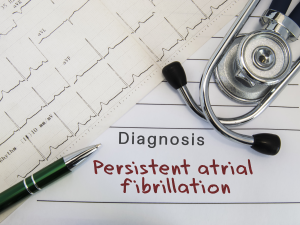58-year-old male admitted through the ED with complaints of cough, palpitations and severe fatigue. Patient has hx of atrial fibrillation on home Eliquis and metoprolol. EKG shows atrial fibrillation with rapid ventricular response. Diagnosed with COPD exacerbation and atrial fibrillation that has continued for the last 9 days.
Vitals: HR 118, RR 18, temp 37.0, BP 110/52, 02 Sat 92% on RA
Labs: WBC 8, GFR >90, lactic acid 1.1
Chest X-Ray: hyperinflated lungs, indictive of COPD
PE: Wheezes and cough, irregular heart rate
Treatment: Pulmonology and cardiology consults
Meds and Treatments Ordered: DuoNebs, IV steroids, IV diltiazem, IV antibiotics, cardioversion
Cardiology Consult: EKG atrial fibrillation with rapid ventricular responses. History of atrial fibrillation
Discharge Summary: COPD exacerbation, A Fib with RVR. Patient cardioverted on third day of admission, returned to normal sinus rhythm
Definition of Types of Atrial Fibrillation:
- I48.20 Chronic atrial fibrillation, unspecified. One definition is atrial fibrillation caused by another cause, e.g. HTN
- I48.0 Paroxysmal atrial fibrillation is atrial fibrillation that is intermittent. This type of atrial fibrillation may stop on its own or with the aid of an intervention within 7 days of onset. People with this type of atrial fibrillation usually have more symptoms than others. As the heart rhythm goes in and out of atrial fibrillation, the pulse rate may change from slow to fast and back again in short periods of time
- I48.11 Longstanding persistent atrial fibrillation is a persistent atrial fibrillation that lasts for more than 12 months
- I48.19 Other persistent atrial fibrillation-Atrial fibrillation that does not stop by itself and lasts a minimum of 7 days. Medications or electrical shock (called cardioversion) is used to help the heart return to normal rhythm
- I48.21 Permanent atrial fibrillation- Atrial fibrillation that is not corrected. Typically, the aim of treatment is geared towards rate control
Question: Are there query opportunities based on the scenario stated above?
Patient Presents with Indicators of Other Persistent Atrial Fibrillation:
- History of A Fib on home meds of Eliquis and metoprolol and EKG showing A Fib with RVR
- CXR hyperinflated lungs
- Complaints of palpitations and severe fatigue
- VS of elevated HR 118, BP 110/52 with irregular rhythm
- Atrial fibrillation for over 7 days
- Treatment for atrial fibrillation included monitoring EKG, IV diltiazem, cardioversion, and cardiology consult
UASI Recommends:
- Query for type atrial fibrillation
Documentation without Clarification:
- Principal Diagnosis: COPD exacerbation (J44.1)
- Secondary Diagnosis: Unspecified atrial fibrillation (I48.91)
- Working DRG: 192 COPD exacerbation without CC/MCC
- RW: 0.6956 GLMOS: 2.2 SOI/ROM: 2/1
Documentation with Clarification:
- Principal Diagnosis: COPD exacerbation (J44.1)
- Secondary Diagnosis: Other persistent atrial fibrillation (I48.19)
- Working DRG: 191 COPD exacerbation with CC
- RW: 0.8843 GLMOS: 2.7 SOI/ROM: 2/1
CDI Educational Tips:
Clinical Indicators for Other Persistent Atrial Fibrillation:
- Current EKG showing atrial fibrillation with rapid ventricular response
- History of atrial fibrillation on home medications of Eliquis and metoprolol- confirmed in atrial fibrillation with rapid ventricular response on current admission
- Complaints of palpitations, HR irregular that does not correct on its own
- Patient out of normal sinus rhythm for over seven days
- Rhythm was corrected with an intervention in this case a diltiazem drip
Treatment to Look for to Support a Diagnosis of Other Persistent Atrial Fibrillation:
- EKG Monitoring
- Cardiology Consult
- Cardioversion
- Medications or Cardioversion to Correct Rhythm
This is a short synopsis of a possible patient record and is not intended to be all inclusive. This is for educational purposes only and not intended to replace your institutional guidelines.
To view previous CDI scenarios, click here.
